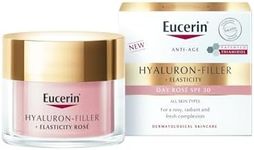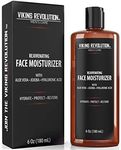Buying Guide for the Best Rosacea Cream
Choosing the right rosacea cream can be a crucial step in managing the symptoms of rosacea, a chronic skin condition characterized by redness, swelling, and sometimes acne-like breakouts. When selecting a rosacea cream, it's important to consider your specific skin type, the severity of your symptoms, and any other skin concerns you may have. Understanding the key specifications of rosacea creams can help you make an informed decision that best suits your needs.Active IngredientsActive ingredients in rosacea creams are the components that directly address the symptoms of rosacea. Common active ingredients include azelaic acid, metronidazole, and brimonidine, each targeting different aspects of rosacea such as inflammation, redness, or bacterial growth. When choosing a cream, consider what symptoms are most prominent for you. If redness is your main concern, a cream with brimonidine might be beneficial. For inflammation and acne-like symptoms, azelaic acid could be more suitable. Always consult with a dermatologist to ensure the active ingredient is appropriate for your skin type and condition.
Moisturizing PropertiesMoisturizing properties in rosacea creams help to hydrate the skin and maintain its barrier function, which is often compromised in rosacea sufferers. Look for creams that contain ingredients like glycerin, hyaluronic acid, or ceramides, which are known for their hydrating and skin-repairing qualities. If your skin tends to be dry and flaky, a cream with strong moisturizing properties is essential. For those with oily skin, a lighter, non-comedogenic moisturizer might be more appropriate to avoid clogging pores.
Fragrance-FreeFragrance-free products are important for individuals with rosacea because fragrances can often irritate sensitive skin and exacerbate symptoms. When selecting a rosacea cream, it's advisable to choose one that is labeled as fragrance-free to minimize the risk of irritation. If you have sensitive skin or have experienced irritation from fragranced products in the past, opting for a fragrance-free cream is a safer choice.
SPF ProtectionSPF protection in rosacea creams helps shield the skin from harmful UV rays, which can trigger or worsen rosacea symptoms. Many rosacea creams include SPF to provide daily sun protection. If you spend a lot of time outdoors or have fair skin that is more susceptible to sun damage, choosing a cream with SPF 30 or higher is recommended. For those who prefer separate products, ensure to apply a broad-spectrum sunscreen over your rosacea cream.
Non-ComedogenicNon-comedogenic products are formulated to not clog pores, which is crucial for individuals with rosacea who may also experience acne-like breakouts. When selecting a rosacea cream, look for the non-comedogenic label to ensure it won't contribute to further skin issues. If you have combination or oily skin, a non-comedogenic cream can help prevent additional breakouts while managing rosacea symptoms.














